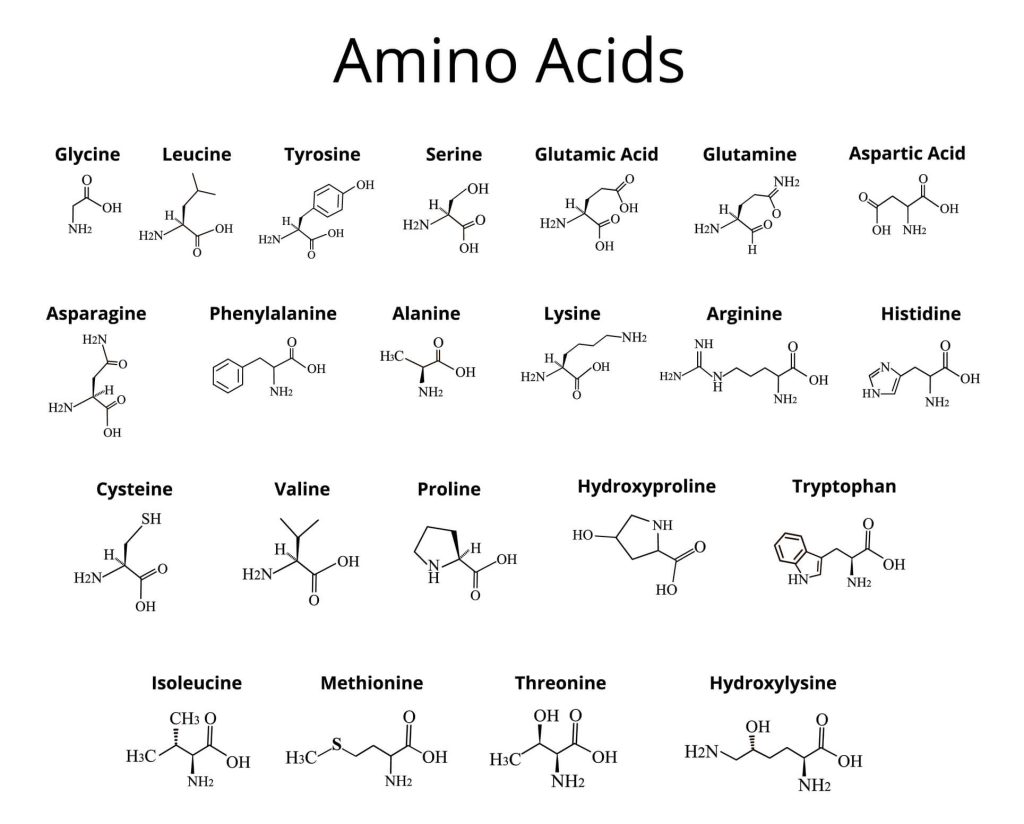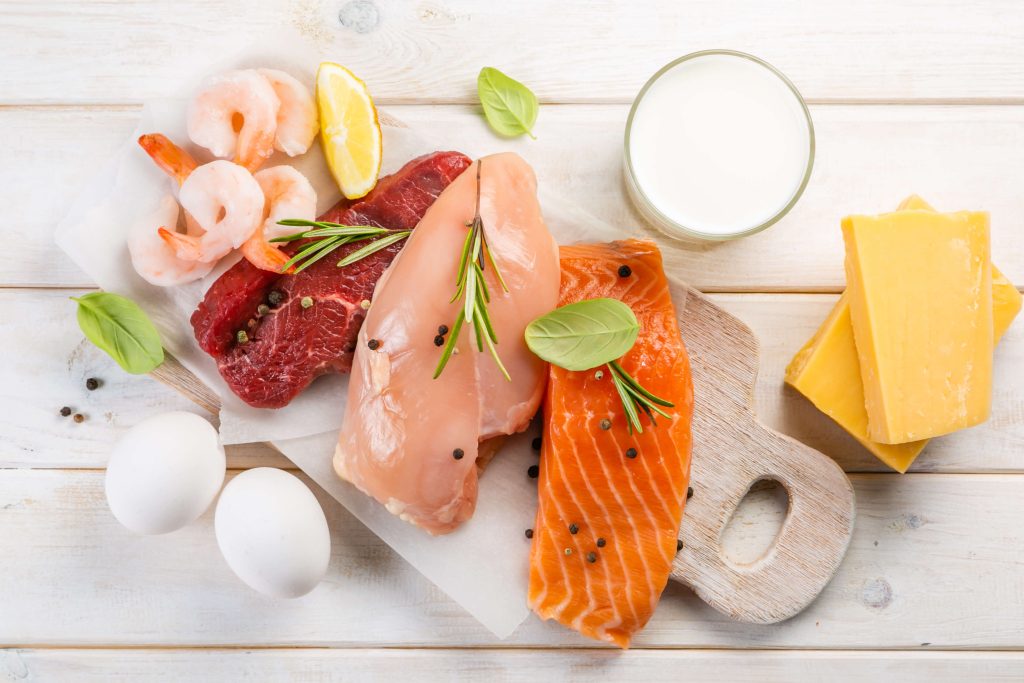
How Do Amino Acids Support Weight Loss?


How Do Amino Acids Support Weight Loss?
If you’re on a weight loss journey, you’ve probably tried various diets and exercise routines. But have you ever wondered how amino acids could help you shed those extra pounds?
By understanding how these powerful nutrients work, you can make smarter choices about what to eat. In this article, we’ll explore how incorporating the right amino acids into your diet may make a real difference in your weight loss efforts, helping you to achieve your goals more effectively and sustainably.

What Are Amino Acids?
“The building blocks of protein.” A phrase that many of us may still be able to access from memory. Amino acids are the basic units that combine to form proteins. In addition, the overall presence of amino acids and some amino acids like leucine also stimulate key signaling pathways (more on this later).
Each protein in the body is made up of a unique sequence of amino acids, which determines its specific structure and function.
Twenty different amino acids build proteins, and we can categorize them into three groups:
Essential Amino Acids: The body cannot synthesize these, so you must get them through your diet. They include:
- Histidine
- Isoleucine
- Leucine
- Lysine
- Methionine
- Phenylalanine
- Threonine
- Tryptophan
- Valine
Non-Essential Amino Acids: Your body can synthesize these, so you don’t need them from your diet. They include:
- Alanine
- Asparagine
- Aspartic acid
- Glutamic acid
- Serine
Conditionally Essential Amino Acids: These amino acids are usually not essential because the body can make them. However, during certain times—like pregnancy, teenage growth spurts, or recovery from injuries—the body can’t produce enough of them, making it necessary to get them from food or supplements. They include:
- Arginine
- Cysteine
- Glutamine
- Glycine
- Proline
- Tyrosine
Proteins play numerous vital roles in the body, including enzyme catalysis, transport, structural support, and regulation of cellular processes. The specific sequence and arrangement of amino acids in a protein determine its shape and function, making amino acids crucial for virtually all biological processes. Now, let’s take a look at what role they can play in weight loss.
Why Are Amino Acids Important for Weight Loss?

Understanding the role of amino acids in weight loss is crucial for optimizing your dietary strategies. Making long-term changes to your diet to improve your amino acid profile can have lasting benefits for weight loss and metabolic health.
Amino Acid Supplements May Boost Performance
Ergogenic supplements are supplements thought to boost physical performance. Researchers believe amino acids can do this by:
- Increasing the release of hormones, such as growth hormone and nitric oxide, that promote muscle growth and repair
- Optimizing how the body uses energy during exercise
- Aiding in recovery to prevent the adverse effects of overtraining
- Reducing mental fatigue, helping to maintain focus and energy during long workouts.
A comprehensive review of studies examined the effects of a dietary amino acid supplement on muscle function, fatigue, and recovery in athletes. Participants took supplements made up of branched-chain amino acids (BCAAs), arginine, and glutamine. Researchers studied effects across various daily doses and periods (10, 30, and 90 days).
Researchers found that amino acid supplementation improves training efficiency by enhancing muscle integrity and the oxygen-carrying capacity of the blood. Benefits included:
- Faster muscle recovery
- Reduced post-exercise damage
- Enhanced blood oxygen levels
- Improved markers of muscle health over extended use
In elite athletes, supplementation over 90 days supported better physical fitness and overall health, while athletes reported feeling physically better with reduced muscle discomfort.
Improved physical performance can enhance weight loss in the long run by boosting calorie burning during exercise and supporting muscle growth that increases metabolism. These factors collectively promote consistent and effective exercise habits, which are crucial for sustainable weight loss.
Promote Muscle-Building/Muscle-Sparing
Weight loss isn’t just about shedding pounds; it’s about losing fat while gaining muscle or at the very least, preventing the loss of it. Building muscle increases your strength and boosts your metabolism, helping you burn more calories even when inactive. This is important because much of the drop in energy expenditure during weight loss is due to a decline in lean mass, the metabolically active tissue.
Amino acids play a crucial role in this process by supporting muscle growth. A study of 14 healthy older adults explored the effects of amino acid supplementation on muscle growth. Participants took 18 g of essential amino acids or 18 g of essential amino acids + 22 g of nonessential amino acids given across three hours, every 10 minutes.
Biopsies 120 and 300 minutes into the experiment revealed significant muscle growth in both groups. This study highlights the importance of amino acids for muscle building. Still, with no difference between the groups, the essential amino acids seem more critical than non-essential amino acids.
Stimulate Growth Hormone
Human growth hormone (hGH) is a protein that helps bones and muscles grow and positively affects overall body composition. Amino acids are a potentially safe way to increase hGH release. They do this by suppressing somatostatin secretion, a hormone that usually inhibits hGH release, releasing more hGH into the bloodstream.
A study of 16 healthy participants tested an oral amino acid blend optimized to increase hGH release. After fasting overnight, participants received both the placebo and the supplement in a randomized order with a 1-week washout period between treatments.
Researchers measured serum hGH at baseline and 15, 30, 60, 90, and 120 minutes post-supplementation. After 120 minutes, hGH levels increased by 682% from baseline, indicating that a single oral amino acid supplement dose significantly boosts hGH levels.
Increased Fat Oxidation

Supplementing with amino acids may increase the fat your body burns to get energy. Lipid oxidation breaks down fats to produce energy, particularly during exercise when the body requires more fuel. This involves several steps:
- The breakdown of fats in fat tissue
- Their transport in the blood
- Their final breakdown in muscle cells to generate energy
When glycogen (stored carbohydrates) is low during exercise, the body increases lipid oxidation to meet energy demands and preserve muscle glycogen.
Branched-chain amino acids (BCAAs) may enhance lipid oxidation, potentially reducing fatigue and improving exercise performance. A small study with seven participants explored whether BCAA supplementation enhances exercise capacity and lipid oxidation.
Participants were given either 300 mg/kg (136 mg/lb) of BCAA or a placebo for three days. On the second day, they performed exercise to deplete glycogen stores, followed by an exhaustive exercise test on the third day. Those taking BCAAs experienced increased resistance to fatigue by 17.2% and a lowered respiratory exchange ratio (RER), suggesting a shift from carbohydrate to fat oxidation.
Activate mTOR
The mechanistic target of rapamycin (mTOR) integrates signals from nutrients, energy levels, and growth factors to control various cellular processes. When you consume amino acids, particularly leucine, you activate mTOR and can benefit from its critical role in weight loss.
Caloric restriction is highly effective for weight loss. However, a common drawback is the loss of lean muscle mass. Maintaining lean muscle depends on stimulating protein synthesis through the mTOR complex. Enhanced muscle retention is critical during weight loss to ensure that the weight lost is primarily fat rather than muscle.
Another way mTOR helps with weight loss is through the gut-brain axis, which is vital for controlling how much we eat and how our bodies use energy. Signals from the gut affect the brain’s hypothalamus, which manages processes like burning calories and processing fats to control weight.
Inside the gut, the mTOR pathway is crucial for producing hormones like ghrelin and nesfatin-1. These hormones help keep our energy balanced and are influenced by what we eat.
- Ghrelin, made in the stomach, makes us hungry and stores fat. Its production depends on both the mTOR pathway and what we eat.
- Nesfatin-1, also from the stomach, reduces appetite. It drops when we fast and can enter the brain to affect how much we eat.
One study looked at how amino acids turn on mTOR in a cell-based study. Scientists used live imaging to watch the movement of RAPTOR, a part of mTORC1, in real-time. They used a fluorescent marker to follow the process inside the cells.
In the experiment, cells were first starved of amino acids and growth factors. Then, researchers gave the cells different combinations of amino acids again.
The study found that amino acids activate the mTORC1 complex within 2 minutes and stay active for up to 5 minutes. The amino acid leucine is a key activator. Different parts of the cell detect amino acids like leucine and arginine, helping to activate mTORC1.
In a whole-person context, muscle protein synthesis can stay elevated for 4 – 5 hours after a high-protein meal, and for up to 36 hours after resistance training.
Which Amino Acids Help Support Weight Loss?

We’ve discussed how important amino acids are to optimizing your weight loss journey, but now let’s look at some of which you might want to focus your intake.
BCAAs- Valine, Leucine, and Isoleucine
Branched-chain amino acids are among the most popularly promoted amino acids for weight loss due to their ability to preserve muscle mass and increase strength.
An eight-week study of 36 strength-trained men explored the effects of BCAA supplementation while training. Participants took 14g BCAAs, 28g whey protein, or 28g carbohydrates while undergoing a resistance training program.
Compared to those taking whey or carbohydrates, participants who supplemented with BCAAs experienced a greater:
- Decrease in body fat
- Increase in lean muscle mass
- Strength gains on bench presses and squats
Another study supported using BCAAs to prevent the loss of lean muscle while losing weight. Seventeen resistance-trained males took either BCAAs or carbohydrates for eight weeks while undergoing a resistance training program and in a caloric deficit.
The BCAA group preserved lean mass and lost fat, whereas the carbohydrate group lost lean and overall body mass. While both groups improved squat strength, those taking BCAAs increased their strength more.
Carnitine
While researchers study BCAA use primarily in strength-trained individuals, supplementation with amino acid carnitine shows promise, particularly in overweight individuals.
Carnitine is produced mainly in the liver and kidneys, with help from vitamin C, iron, and niacin. Researchers believe it supports weight management by controlling blood glucose and lowering lipid levels.
A meta-analysis of 37 clinical trials explored the effects of L-carnitine supplementation on body weight and composition. Researchers found that it notably decreased on average :
- Body weight by 1.21 kg (2.67 lbs)
- BMI by 0.24 kg/m² (0.53 lbs/ft²)
- Fat mass by 2.08 kg (4.58 lbs)
Researchers didn’t observe significant changes in waist circumference or body fat percentage. They also identified an optimal daily dose of 2000 mg to reduce weight.
Glutamine
Glutamine is the most abundant amino acid in the human body and plays a role in many biological functions. Researchers believe its success in supporting weight loss may be due to a couple of possible factors:
Appetite Suppression: Glutamine may help reduce appetite and food intake by stimulating the release of glucagon-like peptide 1, which has appetite-suppressing effects.
Improved Blood Sugar Response: Glutamine supplementation may also help improve the blood sugar response, which helps prevent excess glucose from being stored as fat.
A study of six overweight women explored the effects of glutamine supplementation on weight loss without any dietary or lifestyle changes. Participants took .5mg/kg (.23mg/lb) of body weight of either glutamine or an isonitrogenous protein supplement for four weeks and, after two weeks, switched to the other supplement for an additional four weeks.
Only glutamine supplementation resulted in a noticeable reduction in body weight and waist circumference. On average, body weight decreased by 6.2 lbs (2.8 kg), and waist circumference decreased by 1.5 in (3.8 cm).
A meta-analysis focusing on the effects of glutamine supplementation also noted weight loss effects. Researchers analyzed 25 trials using dosages from 0.09-91 mg/lb (.2- 200 mg/kg). They found that while glutamine supplementation did not affect aerobic performance or body composition, it did result in greater weight loss.
Tyrosine

Tyrosine’s power to help you in your weight loss journey may come from its role as a precursor to dopamine, “the feel-good chemical.” Feeling good may be just the motivation you need to keep pushing through your workout routine and stay on track.
A study involving eight healthy males investigated whether tyrosine supplementation could enhance exercise tolerance during prolonged activity in heat (86°F/30°C). Participants consumed 500 mL of a flavored sugar-free drink, either with or without 68 mg/lb (150 mg/kg) of tyrosine, one hour before cycling to exhaustion.
Those taking tyrosine could cycle five minutes longer on average than those who didn’t. This suggests that tyrosine, a nutrient that helps produce dopamine, may improve endurance and help people tolerate long exercise sessions.
Another study found different results with tyrosine supplementation. In a study involving 20 men, tyrosine supplementation of 68 mg/lb (150 mg/kg) before load-carriage treadmill sessions did not significantly improve aerobic endurance, muscle strength, or anaerobic power compared to a placebo.
These contrasting results suggest its effects may vary depending on the stress conditions involved.
Glycine
While additional human trials are necessary, animal studies suggest that glycine may help preserve muscle mass during caloric restriction.
After eight weeks of a high-fat diet, researchers put subjects on a calorie restriction to cause rapid weight loss. Researchers gave daily subjects supplements of either glycine or alanine, another amino acid, for 20 days. Results showed that glycine supplementation led to greater fat loss and superior muscle preservation compared to alanine.
Best Sources of Amino Acids for Weight Loss

Now that you know how helpful amino acids can support your weight loss journey, you probably want to know where to get them.
The amino acids highlighted in the above studies are all essential or conditionally essential amino acids, which means your body can’t make them on its own. The best approach is to get lots of high-quality protein in your diet and supplement as necessary.
Some of the best sources of protein include:
- Meat
- Eggs
- Dairy
- Fish
But being on a plant-based diet doesn’t mean you can’t get complete protein. The key is to eat a diverse diet. Here are some of the best plant-based protein sources:
- Quinoa
- Buckwheat
- Hemp seed protein
- Chia seed proteins
- Potatoes
- Soy products such as tofu and tempeh
- Seitan (wheat protein)
- Spirulina
- Mycoprotein (AKA Quorn, made from naturally occurring fungus)
Protein Breakthrough, our protein powder, has the perfect plant-based protein blend ratio of pea protein, hemp protein, and pumpkin seed protein.
Plant-protein sources do, however, typically have lower levels of leucine, the amino acid that activates mTOR. If activating mTOR is your goal, consider taking a leucine supplement.
The daily recommended intake for each amino acid varies based on age and other factors, such as activity requiring more. According to the World Health Organization, here are the recommended daily intake amount for adults per 2.2 lb (1 kg) of body weight:
- Histidine: 10 mg
- Isoleucine: 20 mg
- Leucine: 39 mg
- Lysine: 30 mg
- Methionine: 10.4 mg
- Threonine: 15 mg
- Tryptophan: 4 mg
- Valine: 26 mg
Learn more about optimal protein intake recommendations in this article.
Boosting Amino Acid Assimilation

To absorb all the amino acids from protein, your body relies on enzymes to break it down. You can enhance your body’s ability to access these amino acids by including enzymes. Consider adding the following to your diet to achieve your daily protein intake and maximize amino acid assimilation.
MassZymes: a high-protease full-spectrum plant-based digestive enzyme blend that can help maximize protein digestion.
HCL Breakthrough: a blend of betaine HCL and digestive enzymes. Maximizing stomach acidity and digestion in the stomach, maximizes protein digestion and absorption.
Probiotic Breakthrough: a probiotic including 10 billion CFUs/g L. plantarum OMI, a proteolytic bacteria, which can support your protein digestion and assimilation.
Here’s a recipe for a BIOptimized Intra-Workout Amino Acid Shake to enhance your protein digestion and workout performance:
BIOptimized Intra-Workout Amino Acid Shake Recipe
Ingredients:
1 scoop of Protein Breakthrough
1 cup of fruit or 1 banana
1⁄2 tsp of Himalayan salt
2 capsules of MassZymes
2 capsules of Probiotic Breakthrough (probiotic enzyme blend)
Instructions:
Mix all ingredients in a blender until smooth.
Consume 1 to 2 grams of leucine before your workout for enhanced benefits.
This shake boosts your amino acid intake and provides essential nutrients to fuel your energy and support lean muscle gains.
Conclusion
Incorporating amino acids into your diet isn’t just about weight loss—it’s about optimizing your overall health and well-being. Understanding how these essential nutrients work enables you to make informed choices to support your fitness goals and lifestyle.
For a comprehensive guide on crafting a personalized nutrition plan tailored to your unique needs and goals, look no further than The Ultimate Nutrition Bible. Combining extensive research with expert insights, this guide will empower you to create a sustainable and effective “forever diet” that works for you, taking into account your physiology, genetics, gut health, and personal aspirations.
References
- Lopez MJ, Mohiuddin SS. Biochemistry, Essential Amino Acids. StatPearls Publishing; 2024.
- Williams M. Dietary supplements and sports performance: Amino acids. J Int Soc Sports Nutr. 2005;2(2):63. doi:10.1186/1550-2783-2-2-63
- Ohtani M, Sugita M, Maruyama K. Amino acid mixture improves training efficiency in athletes. J Nutr. 2006;136(2):538S-543S. doi:10.1093/jn/136.2.538s
- Volpi E, Kobayashi H, Sheffield-Moore M, Mittendorfer B, Wolfe RR. Essential amino acids are primarily responsible for the amino acid stimulation of muscle protein anabolism in healthy elderly adults. Am J Clin Nutr. 2003;78(2):250-258. doi:10.1093/ajcn/78.2.250
- Olarescu NC, Gunawardane K, Hansen TK, Møller N, Jørgensen JOL. Normal Physiology of Growth Hormone in Adults. MDText.com; 2019.
- Alba-Roth J, Müller OA, Schopohl J, Werder KVON. Arginine stimulates growth hormone secretion by suppressing endogenous somatostatin secretion. J Clin Endocrinol Metab. 1988;67(6):1186-1189. doi:10.1210/jcem-67-6-1186
- Tam CS, Johnson WD, Rood J, Heaton AL, Greenway FL. Increased human growth hormone after oral consumption of an amino acid supplement: Results of a randomized, placebo-controlled, double-blind, crossover study in healthy subjects. Am J Ther. 2020;27(4):e333-e337. doi:10.1097/mjt.0000000000000893
- Gualano AB, Bozza T, De Campos P L, et al. Branched-chain amino acids supplementation enhances exercise capacity and lipid oxidation during endurance exercise after muscle glycogen depletion. J Sports Med Phys Fitness. 2011;51(1).
- McIver CM, Wycherley TP, Clifton PM. MTOR signaling and ubiquitin-proteosome gene expression in the preservation of fat free mass following high protein, calorie restricted weight loss. Nutr Metab (Lond). 2012;9(1):83. doi:10.1186/1743-7075-9-83
- Pena-Leon V, Perez-Lois R, Seoane LM. MTOR pathway is involved in energy homeostasis regulation as a part of the gut–brain axis. Int J Mol Sci. 2020;21(16):5715. doi:10.3390/ijms21165715
- Manifava M, Smith M, Rotondo S, et al. Dynamics of mTORC1 activation in response to amino acids. Elife. 2016;5. doi:10.7554/elife.19960
- MacDougall JD, Gibala MJ, Tarnopolsky MA, MacDonald JR, Interisano SA, Yarasheski KE. The time course for elevated muscle protein synthesis following heavy resistance exercise. Can J Appl Physiol. 1995;20(4):480-486. doi:10.1139/h95-038
- Stoppani J, Scheett T, Pena J, Rudolph C, Charlebois D. Consuming a supplement containing branched-chain amino acids during a resistance-training program increases lean mass, muscle strength and fat loss. J Int Soc Sports Nutr. 2009;6(sup1):P1. doi:10.1186/1550-2783-6-s1-p1
- Dudgeon WD, Kelley EP, Scheett TP. In a single-blind, matched group design: branched-chain amino acid supplementation and resistance training maintains lean body mass during a caloric restricted diet. J Int Soc Sports Nutr. 2016;13(1). doi:10.1186/s12970-015-0112-9
- Talenezhad N, Mohammadi M, Ramezani-Jolfaie N, Mozaffari-Khosravi H, Salehi-Abargouei A. Effects of l-carnitine supplementation on weight loss and body composition: A systematic review and meta-analysis of 37 randomized controlled clinical trials with dose-response analysis. Clin Nutr ESPEN. 2020;37:9-23. doi:10.1016/j.clnesp.2020.03.008
- Laviano A, Molfino A, Lacaria MT, et al. Glutamine supplementation favors weight loss in nondieting obese female patients. A pilot study. Eur J Clin Nutr. 2014;68(11):1264-1266. doi:10.1038/ejcn.2014.184
- Tumilty L, Davison G, Beckmann M, Thatcher R. Oral tyrosine supplementation improves exercise capacity in the heat. Eur J Appl Physiol. 2011;111(12):2941-2950. doi:10.1007/s00421-011-1921-4
- Sutton EE, Coll MR, Deuster PA. Ingestion of tyrosine: Effects on endurance, muscle strength, and anaerobic performance. Int J Sport Nutr Exerc Metab. 2005;15(2):173-185. doi:10.1123/ijsnem.15.2.173
- Caldow MK, Ham DJ, Godeassi DP, Chee A, Lynch GS, Koopman R. Glycine supplementation during calorie restriction accelerates fat loss and protects against further muscle loss in obese mice. Clin Nutr. 2016;35(5):1118-1126. doi:10.1016/j.clnu.2015.08.013
- Joint FAO/WHO/UNU Expert Consultation. Protein and Amino Acid Requirements in Human Nutrition. Accessed July 25, 2024. https://iris.who.int/bitstream/handle/10665/43411/WHO_TRS_935_eng.pdf
